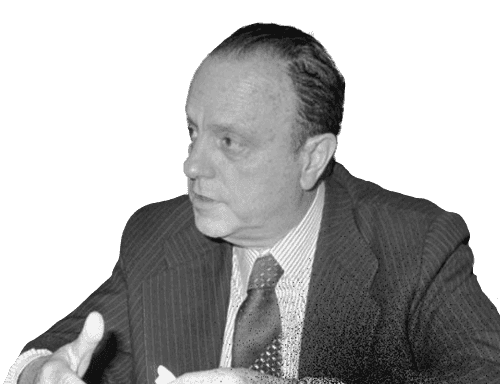He worked his way up through the sole legal party in Spain at the time, the National Movement, before being appointed secretary for information and tourism in 1962. Coming from the reformist faction within the Francoist government, he promoted tourism for the country under the slogan “Spain is different!” while simultaneously being the person who would announce the execution of prisoners by the government. Fraga grabbed international headlines in 1966 by swimming in the sea near the crash of an American B2 bomber that was carrying hydrogen bombs to prove the water had not been contaminated. That same year, he loosened the censorship laws imposed by the Fracoist government. Eventually, he was removed from his post after a conflict with the Opus Dei-supported technocratic faction.
After being removed as minister Fraga went on to found the Gabinete de Orientación y Documentación, S.A. (GODSA), which would become the vessel that would launch his political party. He was appointed ambassador to the United Kingdom in 1973, where he would serve for two years and develop his first overseas connections.
Fraga returned to Spain in 1975 to serve as interior minister and aimed to become the prime minister who would lead the transition of Spain to democracy. However, his term was riddled with massacres and the repression of leftists, leading King Juan Carlos to appoint Adolfo Suarez instead. Unlike Suarez, Fraga sought to keep the communist party illegal and ensure that the opposition was led by the most moderate candidate possible.
Fraga went on to establish the Alianza Popular with the support of the CSU, who poured significant resources into his new party. He additionally sought the support of other right-wing Anglophone politicians such as Ronald Reagan and Margaret Thatcher. Although Alianza Popular became the main opposition party, it failed to gain support, which led to Fraga’s resignation as party leader. He was replaced by Antonio Hernández Mancha and spent a brief stint in the European Parliament. After his reappointment as the head of the party in 1988, he established it as the Partido Popular (PP) and supported Jose Aznar as his replacement. Fraga subsequently became the candidate for the PP in the Regional Parliament of Galicia, his home region.
Fraga spent the next decade and a half achieving absolute majority in the Galician parliament. He would regularly visit South America, creating an unlikely friendship with Fidel Castro, but primarily campaigning in the region to take advantage of the Galician diaspora vote in South America which represents nearly 7% of the Galician electorate. The region of Galicia has consistently had the best results for the PP since the return to democracy, with other parties on the right like Ciudadanos and VOX struggling to gain a foothold in the region.
However, Fraga was ousted as the president of the region after a close election saw his party failing to achieve a majority of the seats. He was appointed to the Spanish upper house shortly after his ouster, where he served until 2011, before retiring from active politics. He died a few months afterwards, having never renounced his support for Franco, choosing to instead claim he was a necessity like Napoleon.


